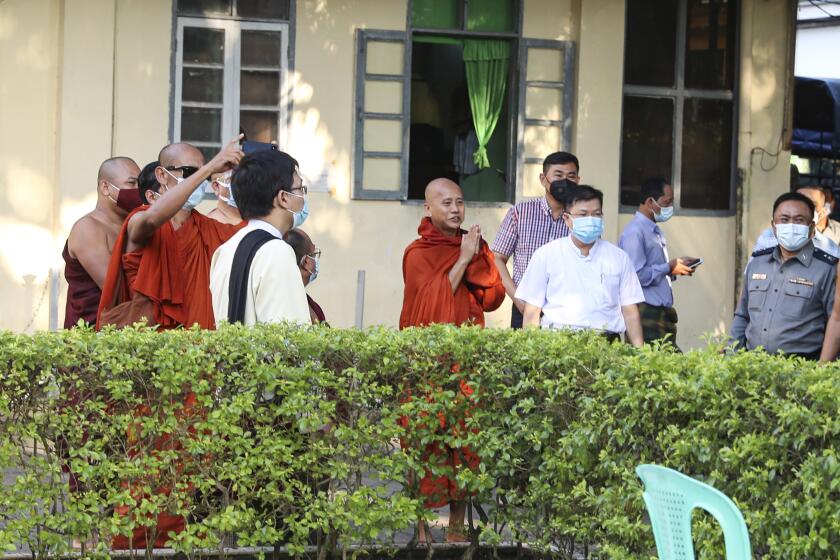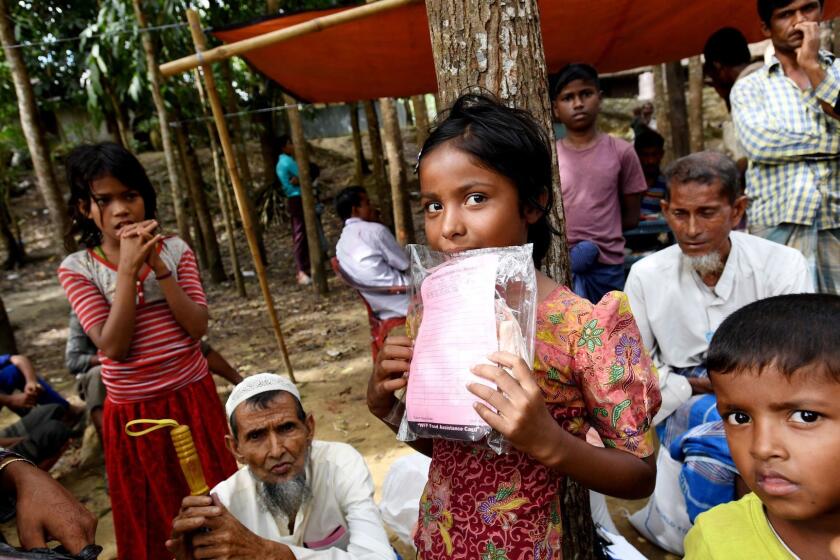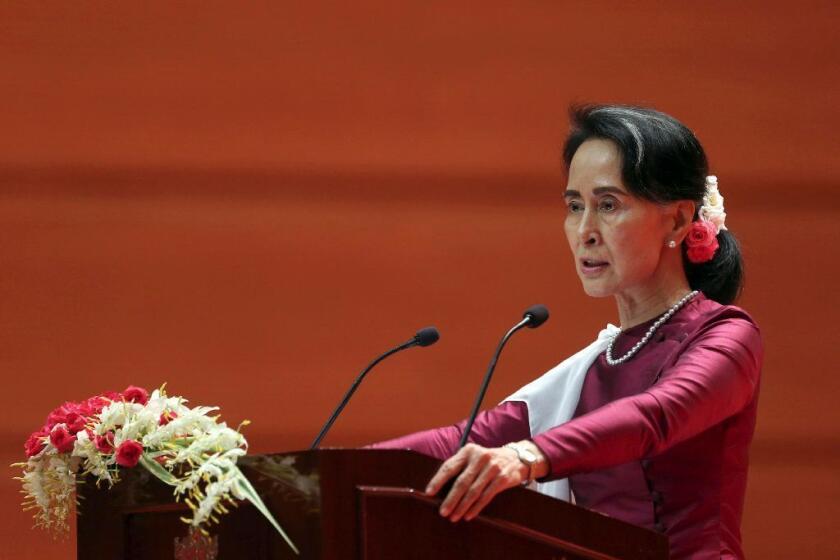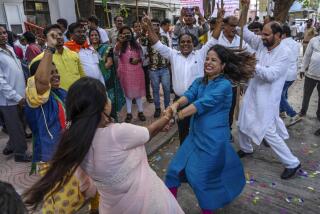Aung San Suu Kyi’s party claims victory in Myanmar elections as ethnic tensions rise
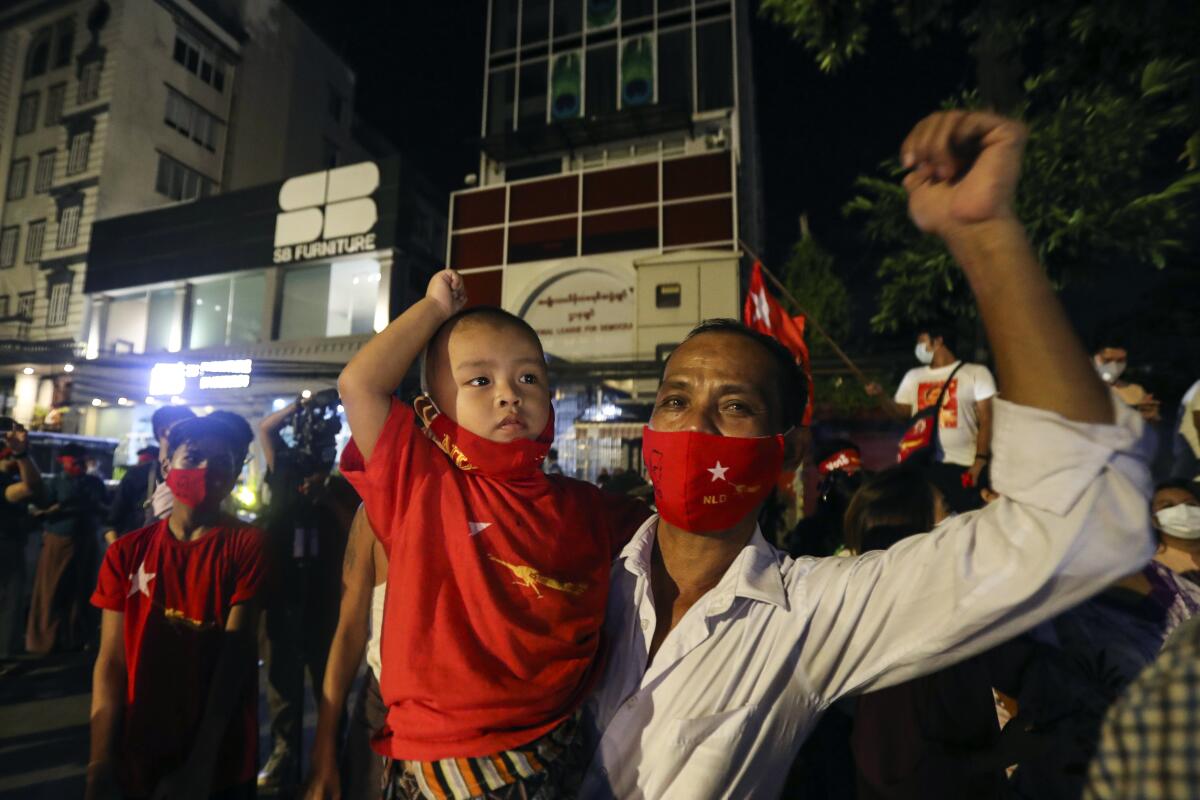
- Share via
YANGON, Myanmar — Myanmar’s ruling National League for Democracy claimed Monday to have won enough seats to secure a majority in parliament, guaranteeing the party of Aung San Suu Kyi another five years in power in the nascent democracy.
The result of the country’s second free election after decades of military rule was never much in doubt. Despite international scorn for defending the massacre of Rohingya minorities, Suu Kyi commands an unshakable following among the nation’s majority Buddhist Bamar, who account for more than two-thirds of Myanmar’s 54 million people.
In addition, more than 1.6 million ethnic-minority residents were barred from voting in an election that international observers said was neither free nor fair.
The apparent victory for Suu Kyi’s party in Sunday’s polls comes despite worsening economic conditions and a quickly escalating COVID-19 crisis that’s straining the Southeast Asian nation’s healthcare system. More than 60,000 cases and 1,400 deaths have been reported since mid-March.
Poll workers in Yangon were seen wearing masks, face shields and gloves, and voters were offered face coverings. Social distancing was difficult to enforce because of the high turnout.
Later in the evening, NLD supporters ignored COVID-19 restrictions by gathering outside the party’s headquarters in Yangon, the nation’s largest city, to wait for results.
A nationalist Buddhist monk in Myanmar noted for his inflammatory anti-Muslim rhetoric has surrendered to police seeking his arrest.
An NLD spokesman later said the party had won the 322 seats needed to form a government, though its power will be checked. Under the country’s constitution, the military, known as the Tatmadaw, is guaranteed a quarter of all seats in parliament — an arrangement seen as a barrier to economic and political reforms.
There were no reports of violence Sunday, though tensions ran high in the days leading up to the election after the country’s army chief, Min Aung Hlaing, refused to commit to honoring the results of Sunday’s polls, raising fears of a military takeover.
Min Aung Hlaing, an accused war criminal, quickly reversed course, though he briefly drew comparisons here to President Trump, who has yet to concede last week’s U.S. presidential election.
While enthusiasm was high in Yangon, analysts warned that the mass disenfranchisement of ethnic-minority voters could exacerbate tensions and ongoing civil conflict.
Myawady Sayadaw, a crimson-robed monk whose eyes dance behind round spectacles, casts himself as a genial warrior in Myanmar’s long struggle against military rule.
The Rohingya Muslim minority, which was subjected to a brutal campaign of violence spearheaded by Min Aung Hlaing in 2017, is largely excluded from voting or running for office because of citizenship laws critics say are arbitrary and discriminatory.
This year, polls were canceled in most of Rakhine state, where many Rohingya live, because of an escalating war between the Myanmar military and the Arakan Army, which desires greater autonomy for Rakhine. Despite this, initial results indicate that the local Arakan National Party still won the most remaining seats in the state, including in areas that the NLD won in 2015.
“The election results in Rakhine show clearly strong support for the ANP, which mirrors many of the grievances of the Arakan Army,” said political analyst David Mathieson. “However, as the NLD and the Tatmadaw seem resistant to really granting any concessions to the Rakhine political parties or armed groups, the conflict there will continue to rage.”
Kyaw Lynn, a 23-year-old political science student from Rakhine studying in Yangon, was one of many denied a vote. The government said it was because of ongoing violence in his region, though many accuse the NLD of orchestrating poll cancellations in areas where it did not expect to perform well.
“Voting was canceled even though there is no fighting” in my township, Kyaw Lynn said.
In a three-day hearing, which began Tuesday, the 74-year-old leader is expected to rebuff charges that Myanmar carried out a systematic campaign of mass murder, rape and terror against the Rohingya.
Even if voting were granted, Kyaw Lynn, like many in Rakhine, is skeptical it would make a difference. Despite winning the most votes in the state in 2015, the ANP failed to garner more political power. That could mean that what began as a quest for greater autonomy could soon morph into an independence movement.
“Unfortunately, the NLD failed to prioritize peace in its first term, and there is little indication it will do so after 2021,” said Mathieson, adding that the NLD continues to insist on “capitulation” from ethnic armed groups rather than compromise.
“A more magnanimous government would use some of its landslide legitimacy to reach out to ethnic parties to work together,” Mathieson said, “but the NLD will likely gloat that its victory doesn’t need to be diluted by compromise.”
Although the NLD benefits from Suu Kyi’s name recognition, its supporters also credit the party with building more infrastructure and public services.
Than Than Htay, a 53-year-old homemaker, said she voted for the NLD in both Sunday’s elections and in 2015.
“Their performance has been good over the last five years,” she said. “Everything has changed. The roads, the buses, the hospitals have all improved.”
News Alerts
Get breaking news, investigations, analysis and more signature journalism from the Los Angeles Times in your inbox.
You may occasionally receive promotional content from the Los Angeles Times.
Grace, a 30-year-old small-business owner who stopped to take a celebratory selfie with a friend after voting for the NLD in Yangon’s downtown Kyauktada township, urged patience with Myanmar’s democracy.
“We’re a developing country,” said Grace, who declined to give her last name.
Grace doesn’t blame the NLD for failing to institute deeper democratic reforms during its first term, saying the party has been held back by the military, which can veto constitutional reforms.
“The NLD does what they can, but they don’t have full authority,” she said. “We can see even in the United States right now things are very complicated.”
Critics say Suu Kyi could have done more to push back against the Tatmadaw. Instead, she defended military leaders from accusations of genocide against the Rohingya at the International Court of Justice last year and praised the military’s recent operations against the Arakan Army in Rakhine, despite the United Nations special rapporteur‘s warning that it could be committing fresh war crimes.
Khin Maung, a Rohingya activist who followed the elections from his refugee camp in Bangladesh, said he was horrified by the lack of outrage over the vote being taken away from Rohingya.
“Why is the world silent?” he said. “The international community is not taking action. All day I am sitting and thinking, what is our future? When will we have equal rights?”
More to Read
Sign up for Essential California
The most important California stories and recommendations in your inbox every morning.
You may occasionally receive promotional content from the Los Angeles Times.
